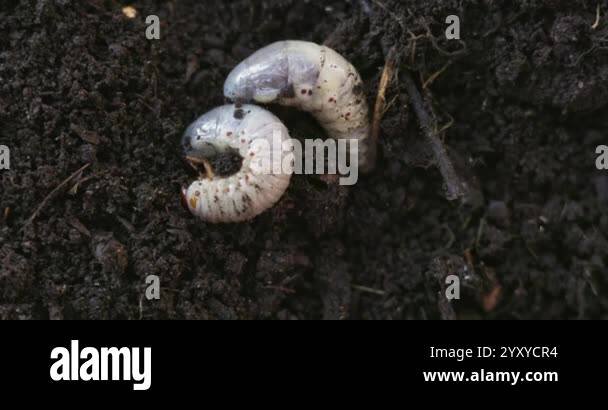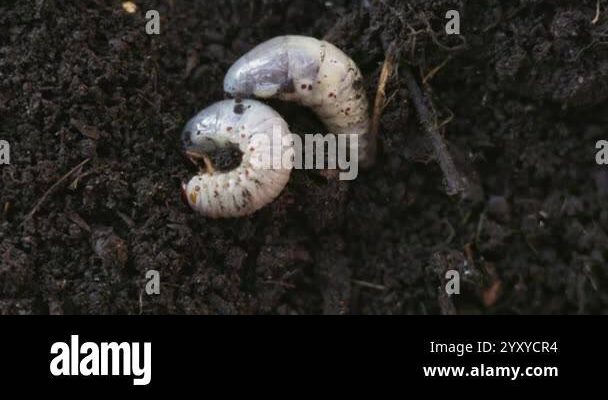
So, what’s the deal with grub worms? Often misunderstood, these larvae can actually help break down organic material and aerate the soil. Just like how nutrients in a smoothie come from combining fruits and veggies, a garden thrives on a mix of different organisms, including those tiny, wriggly grubs. You might be thinking, “Are they really that important?” Let me explain how these critters can fit into your gardening plans, even if it feels a bit unconventional at first.
What Are Grub Worms?
Grub worms, commonly referred to as **grubs**, are the larvae of various beetles, such as Japanese beetles and June bugs. They typically look like small, white, C-shaped worms, and they’re usually found in the soil or thatch of your lawn and garden. Their main job? To feed on organic matter, including decaying leaves, grass roots, and other decomposing materials.
Here’s a fun fact: grubs play a vital role in breaking down organic matter into nutrients that plants can easily absorb. Think of them as nature’s recycling team, helping to keep your garden healthy and fertile. However, it’s essential to manage their population, as too many can lead to root damage to your beloved plants.
How Grub Worms Contribute to Soil Health
So, how exactly do grub worms help your garden thrive? First off, they help with **soil aeration**. As they burrow through the ground, they create tiny tunnels that allow air, water, and nutrients to reach plant roots more effectively. This is important for promoting healthy plant growth.
Moreover, grubs are like little composters. As they munch on organic materials, they break them down, making it easier for plants to access essential nutrients. Think of it this way: when you eat a healthy meal, you’re not just feeding yourself; you’re fueling your body. Grubs do the same for the soil by turning old, decaying matter into nutrient-rich mulch. This natural process reduces the need for chemical fertilizers and helps you maintain a **sustainable garden**.
Balancing Grub Worms in Your Garden
While grubs can be beneficial, it’s crucial to find a balance. Too many grubs can cause problems, especially if they start feeding on plant roots. This can lead to unhealthy plants or even dead patches in your garden. To avoid this, keep an eye on their population.
Here are a few ways you can manage grub worms without resorting to harmful chemicals:
- Encourage Natural Predators: Birds, frogs, and beneficial insects like nematodes love to feast on grubs. By attracting these creatures to your garden, you can help keep grub numbers in check.
- Practice Crop Rotation: This technique involves changing the types of plants you grow in different areas each season. It disrupts the grub life cycle and helps prevent infestations.
- Healthy Soil Practices: Build rich, healthy soil through composting and mulching. This not only nourishes your plants but also supports a balanced ecosystem where grubs can thrive without becoming pests.
Organic Methods to Control Grub Worms
If you find that your garden has a grub problem, there are several organic methods you can use to control their numbers without harming the environment. Here are some effective strategies:
1. **Neem Oil:** This natural pesticide interrupts the life cycle of the grubs. Spraying neem oil on your soil can help reduce their population without affecting beneficial insects.
2. **Milky Spore:** This is a natural bacterium that specifically targets grub larvae. It can be applied to the soil, and once ingested, it infects the grubs, reducing their numbers over time.
3. **Beneficial Nematodes:** These tiny microscopic worms are a natural enemy of grubs. When introduced to your garden soil, they seek out and infect the grubs, providing a natural way to control their population.
By using these organic methods, you can maintain a healthy balance of grubs in your garden, allowing them to contribute to soil health while preventing overpopulation.
The Benefits of a Diverse Ecosystem
Creating a **sustainable garden** isn’t just about managing pests—it’s about fostering a rich, diverse ecosystem. Grub worms are part of that ecosystem, and understanding their role helps you appreciate your garden more fully.
By encouraging biodiversity, you’re not only supporting grubs, but you’re also promoting a habitat for various beneficial organisms. This can include bees, ladybugs, earthworms, and many more. Each of these creatures plays its role in maintaining soil health and plant growth, contributing to an overall thriving garden.
You might be wondering how to start building this diversity in your garden. Here are a few tips:
- Plant Native Species: They tend to attract local wildlife, which helps support your garden’s ecosystem.
- Provide Shelter: Areas like brush piles or stone features can offer homes for beneficial insects and critters.
- Avoid Pesticides: Chemical treatments can harm not only grubs but also the beneficial organisms you want to encourage.
Grub Worms vs. Other Garden Pests
Now, you might be thinking about how grubs stack up against other common garden pests. Unlike harmful insects like aphids or spider mites, which suck the life out of your plants, grubs mainly feed on organic material and roots.
Here’s a quick comparison to help you see the difference:
| Pest | Impact | Management |
|---|---|---|
| Grub Worms | Can damage roots, but also enrich soil. | Encourage predators, use organic treatments. |
| Aphids | Suck sap, weaken plants, can spread disease. | Introduce ladybugs, use insecticidal soap. |
| Spider Mites | Can cause webbing and leaf damage. | Increase humidity, introduce predatory mites. |
As you can see, while some pests can seriously harm your plants, grubs have a more mixed reputation. With the right management strategies, they can contribute positively to your gardening efforts.
In conclusion, **grub worms** can indeed play a valuable role in a sustainable garden. They help with soil health, contribute to the nutrient cycle, and fit nicely into a balanced ecosystem. By managing their population organically, you can reap the benefits without letting them take over.
Remember, gardening is all about balance. Just like in life, every element matters, even the ones that seem a little out of place at first. So the next time you see a grub worm wriggling in your soil, consider it a partner in your quest for a thriving, sustainable garden. Embrace the diversity that nature provides, and you’ll be rewarded with a rich and healthy garden for years to come.

